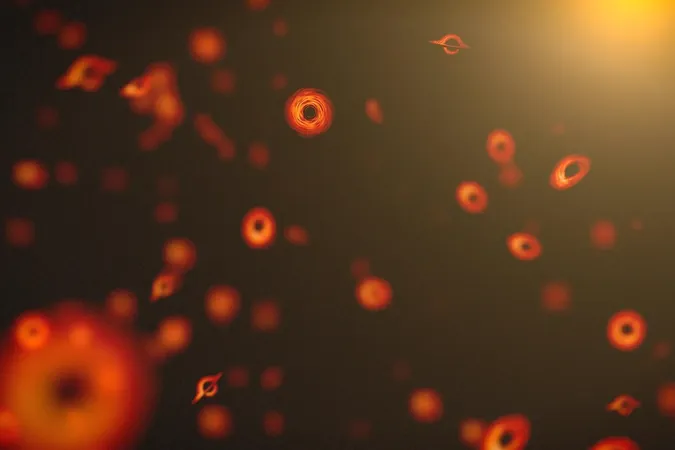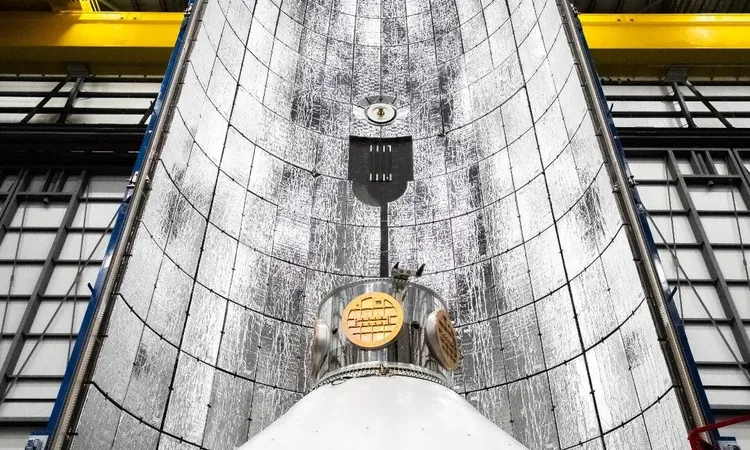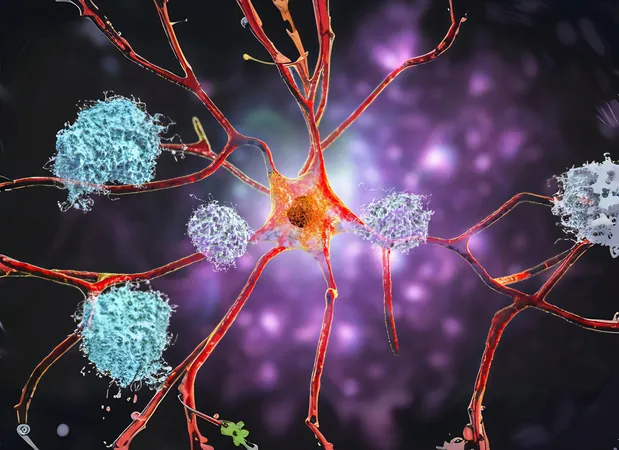
Unlocking the Mysteries of the Universe: Are Primordial Black Holes Hidden in Our Own Backyard?
2024-12-02
Author: Jia
Imagine the dramatic collapse of a massive star, creating a mesmerizing black hole. Yet, there's another fascinating possibility lurking in the shadows of the universe: primordial black holes (PBHs). These enigmatic entities may have formed in the chaotic infancy of the cosmos, long before any stars illuminated the dark expanse of space.
Primordial black holes have been a topic of theorization for decades, and some scientists even propose that they could be the elusive dark matter, which constitutes a staggering 85% of the universe's mass. The catch? No one has ever witnessed a primordial black hole firsthand.
A recent groundbreaking study, led by researchers from the University at Buffalo, suggests we may need to rethink our search strategies for PBHs. The study posits that signs of these primordial black holes could be hiding in large celestial bodies, such as hollow planetoids in space, or even in the most mundane materials right here on Earth, including rocks, metals, and glass.
Scheduled for publication in the December issue of Physics of the Dark Universe, this theoretical research proposes that a primordial black hole could nest within a celestial object, devouring its liquid core and leaving it hollow like a cosmic egg. Alternatively, a more mobile primordial black hole could create micro-tunnels through solid materials, potentially discoverable under a microscope.
"The chances of finding these signatures are low, but conducting these searches would require minimal resources. The potential breath-taking discovery of evidence for primordial black holes could change everything we know about the universe," explains Dejan Stojkovic, Ph.D., a co-author of the study and a physicist at the University at Buffalo.
Hollow Planetoids: Cosmic Chaotic Remnants
During the rapid expansion of the universe post-Big Bang, some regions could have experienced higher density, leading to the formation of primordial black holes far less massive than those created by dying stars. These objects might contain the mass of a mountain packed into the dimensions of an atom.
The researchers explored the intriguing scenario where a primordial black hole gets encapsulated within a planet or asteroid. A significant find suggests that if an object possessed a liquid core, a captured PBH could vaporize this core, resulting in a hollow shell should the object later suffer an impact from another asteroid.
However, such hollow structures would face the challenge of maintaining their integrity; the study suggests that a PBH's hollow shell could only be up to one-tenth the size of Earth’s radius without collapsing under its own gravitational tension.
Your Home Could Be a Black Hole Detector!
Even more astonishingly, the researchers propose that primordial black holes could leave detectable marks in everyday objects. If a primordial black hole with a mass of 10^22 grams passed through solid material, it might create a tunnel merely 0.1 microns thick. This means that old materials could potentially serve as effective "detectors" for such phenomena.
The odds of a primordial black hole passing through ancient rocks or buildings are incredibly slim—around 0.000001 for boulders billions of years old. However, the potential to discover previously hidden secrets of the universe using common materials makes the search an attractive pursuit.
Worried about being struck by a primordial black hole? Fear not—experts assure that if a PBH were to pass through a person, it would not cause harm due to the small amount of tension in human tissue.
The Need for New Theoretical Paradigms
As our understanding of the universe grows, so does the importance of theoretical studies like this one. Stojkovic highlights the pressing need for new frameworks in physics, particularly in dark matter research, which has seen very few breakthroughs despite extensive effort over the past century.
"The greatest minds have addressed these enigmatic questions for decades without definitive answers," he adds. "We may need a revolutionary shift in our theoretical models to uncover the hidden truths of the universe, including the potential existence of primordial black holes."
As we continue exploring the cosmos, the implications of this research could be monumental, possibly reshaping our understanding of dark matter and the very fabric of reality itself. Who knows? The answers may be lurking just beneath our feet or above our heads, waiting to be discovered.





 Brasil (PT)
Brasil (PT)
 Canada (EN)
Canada (EN)
 Chile (ES)
Chile (ES)
 España (ES)
España (ES)
 France (FR)
France (FR)
 Hong Kong (EN)
Hong Kong (EN)
 Italia (IT)
Italia (IT)
 日本 (JA)
日本 (JA)
 Magyarország (HU)
Magyarország (HU)
 Norge (NO)
Norge (NO)
 Polska (PL)
Polska (PL)
 Schweiz (DE)
Schweiz (DE)
 Singapore (EN)
Singapore (EN)
 Sverige (SV)
Sverige (SV)
 Suomi (FI)
Suomi (FI)
 Türkiye (TR)
Türkiye (TR)